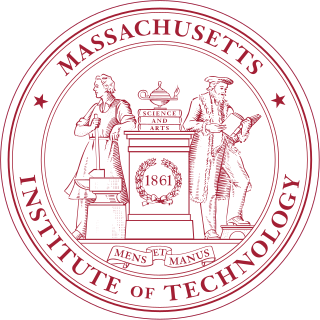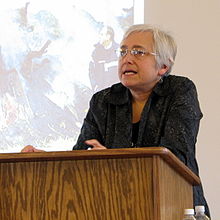
The Massachusetts Institute of Technology (MIT) is a private land-grant research university in Cambridge, Massachusetts. Established in 1861, MIT has played a significant role in the development of many areas of modern technology and science.

Radcliffe College was a women's liberal arts college in Cambridge, Massachusetts, and functioned as the female coordinate institution for the all-male Harvard College. Considered founded in 1879, it was one of the Seven Sisters colleges and held the popular reputation of having an intellectual, literary, and independent-minded female student body.

Barbara Liskov is an American computer scientist who has made pioneering contributions to programming languages and distributed computing. Her notable work includes the introduction of abstract data types and the accompanying principle of data abstraction, along with the Liskov substitution principle, which applies these ideas to object-oriented programming, subtyping, and inheritance. Her work was recognized with the 2008 Turing Award, the highest distinction in computer science.

Shih Choon Fong is a Singaporean college administrator and fracture mechanics expert who served as the founding president of the King Abdullah University of Science and Technology (KAUST) between 2008 and 2013. Prior joining KAUST as its founding president, he was the president of the National University of Singapore (NUS) for nine years and has been widely acknowledged for creating the university's research-intensive focus with an entrepreneurial dimension, as well as for NUS' elevated global reputation. Drawing from his experiences abroad, Shih institutionalised a performance- and market-based evaluation and compensation system for academics.
Diana L. Eck is a scholar of religious studies who is Professor of Comparative Religion and Indian Studies at Harvard University, as well as a former faculty dean of Lowell House and the Director of The Pluralism Project at Harvard. Among other works, she is the author of Banaras, City of Light, Darsan: Seeing the Divine Image in India, Encountering God: A Spiritual Journey from Bozeman to Banaras, A New Religious America: How a Christian Country Became the World's Most Religiously Diverse Nation, and "India: A Sacred Geography." At Harvard, she is in the Department of South Asian Studies, the Committee on the Study of Religion, and is also a member of the Faculty of Divinity. She has been the chair for the Committee on the Study of Religion. She also served on the Humanities jury for the Infosys Prize in 2019.

The history of the Massachusetts Institute of Technology can be traced back to the 1861 incorporation of the "Massachusetts Institute of Technology and Boston Society of Natural History" led primarily by William Barton Rogers.
Julie A. Reuben is a historian interested in the role of education in American society and culture. Her teaching and research address broad questions about the purposes of education; the relation between educational institutions and political and social concerns; and the forces that shape educational change.
Marshall Irwin Goldman was an American economist and writer. He was an expert on the economy of the former Soviet Union. Goldman was a professor of economics at Wellesley College and associate director of the Harvard Russian Research Center. Goldman received his Ph.D. in Russian studies from Harvard University in 1961. Goldman was well known for his study of the career of Mikhail Gorbachev. His books on the former Soviet Union include The USSR in Crisis: The Failure of an Economic System, Lost Opportunity: What Has Made Economic Reform in Russia So Difficult, and Petrostate.
Irving Singer was an American professor of philosophy who was on the faculty of the Massachusetts Institute of Technology for 55 years and wrote over 20 books. He was the author of books on various topics, including cinema, love, sexuality, and the philosophy of George Santayana. He also wrote on the subject of film, including writings about the work of film directors Ingmar Bergman, Alfred Hitchcock.
Diana Chapman Walsh was President of Wellesley College from 1993 to 2007. During her tenure, the college revised its curriculum and expanded its programs in global education, internships and service learning, and interdisciplinary teaching and learning. The faculty established new majors in environmental studies, quantitative reasoning, cinema and media studies, neurosciences, and astrophysics. Japanese, Arabic and Korean languages were added to the curriculum as well, and a new department of East Asian Languages and Literatures was launched.

Sanjay Subrahmanyam is an Indian historian who specialises in the early modern period and in connected history. He is the author of several books and publications. He holds the Irving and Jean Stone Endowed Chair in Social Sciences at UCLA which he joined in 2004.

Sheila Sen Jasanoff is an Indian American academic and significant contributor to the field of Science and Technology Studies. In 2021 she was elected to the American Philosophical Society. Her research has been recognized with many awards, including the 2022 Holberg Prize "for her groundbreaking research in science and technology studies."
Sunil Khilnani is a professor of politics and history at Ashoka University, India. Previously, he was a professor of politics and the Director of the King's College London India Institute. He is a scholar of Indian history and politics best known as the author of The Idea of India (1997). He was the presenter of a BBC Radio 4 series entitled Incarnations: India in 50 Lives, which was later published as a book in 2016. He was a 2010 Berlin Prize Fellow, and he was also a recipient of the Indian government's 2005 Pravasi Bharatiya Samman award.
Carol Yvonne Espy-Wilson is an electrical engineer and Professor of Electrical and Computer Engineering at the University of Maryland (UMD) at College Park. She received her Ph.D. in Electrical Engineering from the Massachusetts Institute of Technology in 1987.
Jennifer Elaine Whiting is an American philosopher who teaches at the University of Pittsburgh. She has also taught at Harvard University and Cornell University, and was Chancellor Jackman Professor of Philosophy at the University of Toronto.
Nayanjot Lahiri is a historian and archaeologist of ancient India and a professor of history at Ashoka University. She was previously on the faculty of the department of history at the University of Delhi.
Caroline A. Jones, is an American art historian, author, curator, and critic. She teaches and serves within the History Theory Criticism Section of the Department of Architecture at MIT School of Architecture and Planning, Cambridge, Massachusetts, United States.
Sunil S. Amrith is a historian who is the Renu and Anand Dhawan Professor of History at Yale University. His research interests include transnational migration in South and Southeast Asia.

Melissa Nobles is an American political scientist and academic administrator. She is currently Chancellor and Professor of Political Science at the Massachusetts Institute of Technology in Cambridge, Massachusetts. She previously served as the Kenan Sahin Dean of the MIT School of Humanities, Arts, and Social Sciences and Arthur and Ruth Sloan Professor of Political Science.
Rosalind Helen Williams is an American historian of technology whose works examine the societal implications of modern technology. She is Bern Dibner Professor of the History of Science and Technology, Emerita at the Massachusetts Institute of Technology.








